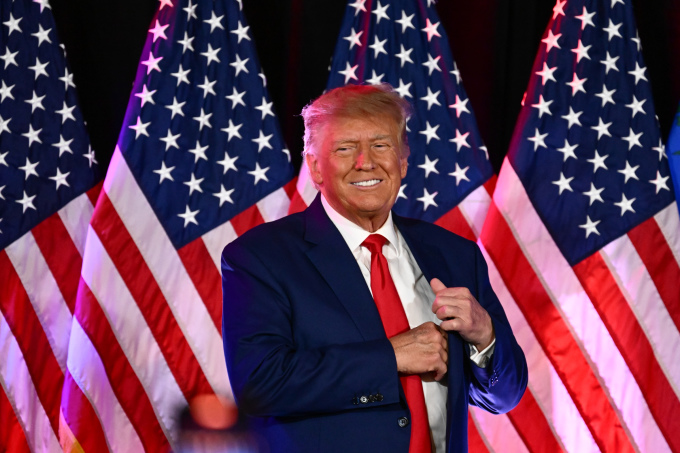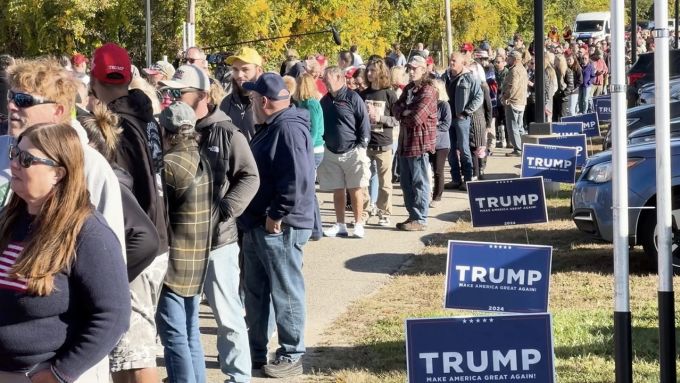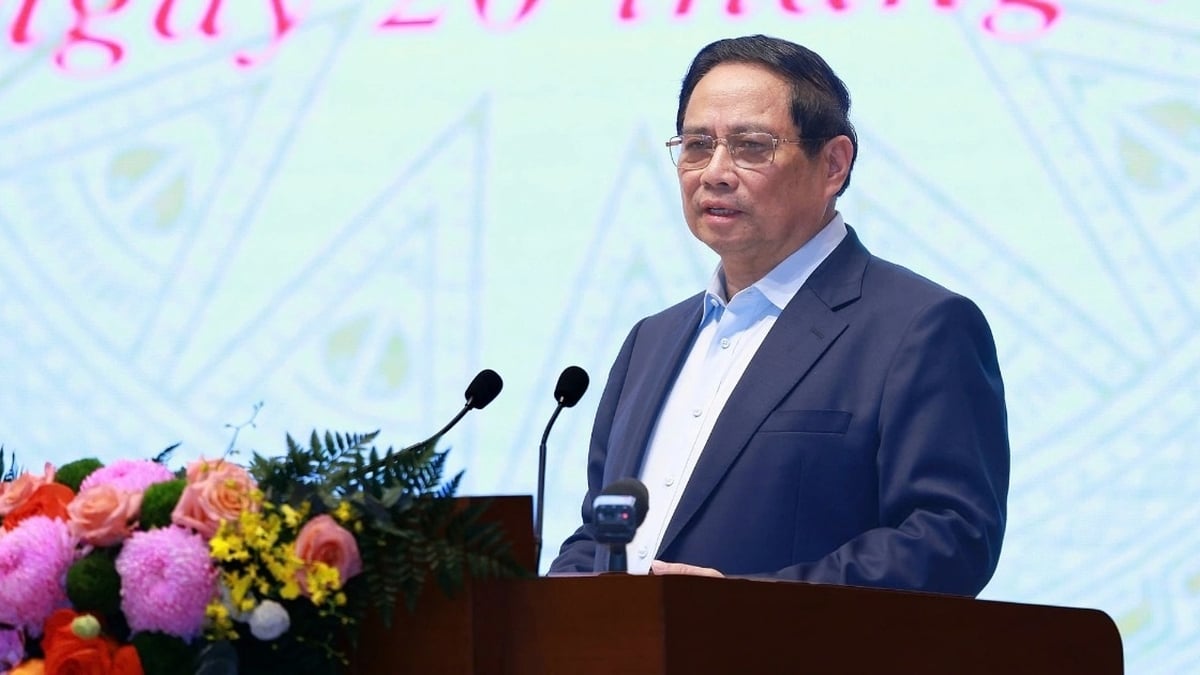As the cost of living increases, many voters believe Mr. Trump is the top choice to improve the US economy in the future.
The race for the White House is heating up, especially among Republicans, as candidates battle it out for their party’s nomination. The Iowa caucuses on January 15 will be the first shot in the primary, with New Hampshire holding its vote a week later.
Recent polls show former President Donald Trump as the Republican Party's most promising candidate, as he consistently outpaces other rivals such as former South Carolina Governor Nikki Haley and Florida Governor Ron DeSantis.
For many Republican voters, Mr Trump is the man who can manage the economy, their top concern. The latest FT-Michigan Ross poll makes this clear.
The poll was conducted by Democratic strategists at Global Strategy Group and Republican pollster North Star Opinion Research, and surveyed about 1,000 likely voters across the country between December 28 and January 2.
The poll found that two-thirds of Republicans said they trusted Trump more than any other candidate in the party to handle the economy. While about 67% of Trump supporters, Haley and DeSantis received approval from only 8% and 9% of respondents, respectively.

Former US President Donald Trump in Las Vegas, Nevada in July 2023. Photo: AFP
The latest economic poll reflects Mr Trump’s lead among Republicans heading into the primary. More than half of Iowa caucus voters and 44% of New Hampshire Republicans are expected to back Mr Trump.
Governor DeSantis came in second in the Iowa poll with 18.4%, while Haley came in second in New Hampshire with 25.7%.
During his election campaign, Mr. Trump praised the strength of the US economy while he was in the White House and emphasized that "the next economic boom" would begin as soon as he was elected President of the United States in November.
Haley, a former U.S. ambassador to the United Nations under Trump, is campaigning on foreign policy credentials, branding herself a fiscal conservative (cutting taxes, cutting government spending) and blaming the current inflation on billions of dollars in federal spending under Trump and President Joe Biden.
DeSantis has vowed to cut taxes if elected and proposed a federal income tax floor for all Americans.
However, their promises seem to have failed to bear fruit as Mr Trump remains trailing far in the polls.
Ms Haley has focused her campaign on New Hampshire, where independents make up a significant portion of the Republican primary electorate. But a survey by FT-Michigan Ross found that more than a third of independents surveyed said they trusted Mr Trump on the economy.
Haley's approval rating among this group is about 10%. About a quarter of independents say they have no confidence in any Republican candidate to handle the US economy.
“Many Republican voters and some Democratic voters still remember the economy under Trump as being better than it is now,” said Erik Gordon, a professor at the Ross School of Economics at the University of Michigan.
Under Trump, the unemployment rate fell to a half-century low of 3.5% in early 2020, just before the pandemic. Under Biden, it has fallen even further, to 3.4% early this year, and is now at 3.7%.
But inflation is a persistent challenge for the Biden administration. Prices have risen rapidly since the pandemic, leading to the highest inflation rate in more than 40 years. Americans are facing rising costs for almost everything from groceries to gasoline to cars to health care.
During Trump's four years in office, the highest recorded national median home price was nearly $350,000, while it was nearly $500,000 under Biden.
Under Biden, pandemic-related disruptions, the war in Ukraine and surging demand have sent gas prices soaring since 2020. Gasoline prices more than doubled from April 2020 to April 2022, from $1.84 to $4.11 a gallon.
President Biden is using Bidenomics as a campaign platform, an agenda of billions of dollars in public investment, focusing on middle-income workers, and efforts to revive the “Rust Belt.”
The Rust Belt is a term used to describe the Midwestern states that were once the "industrial powerhouses" of the United States but have seen a recession since 1980. This belt begins in central New York state, runs through the western states of Pennsylvania, Ohio, Maryland, Indiana and Michigan, and ends in northern Illinois, eastern Iowa and southeastern Wisconsin.
The White House has touted record job creation under Biden, declaring “2023 a great year for American workers.” But much of the American public, including many voters of color and young people, sees a different picture. They point to incomes that are not enough to cover basic needs such as groceries, cars, housing, childcare, and elder care.
The FT-Michigan Ross poll found that just 38% of voters approve of Biden’s handling of the economy, while 60% disapprove. Eighty-five percent of respondents said rising prices were one of their biggest concerns, while just over half cited income.
Mr Trump has criticized Bidenomics in recent remarks, blaming the US President for "inflationary disasters".
"Just ask yourself, are you better off than you were five years ago? Or are you better off now amid inflation, with bacon four times what it was a while ago? Nobody's ever seen anything like that," Trump said at a campaign rally in Waterloo, Iowa, in December.
Inflation in the US has fallen by more than half over the past year to about 3.1% in November 2023, but more than 50% of survey respondents said they felt prices were rising faster than that.
"When he was president, our country changed so much. It reminded me of the days under Ronald Reagan," Marie Freudenberg, a New Hampshire voter, said of Mr. Trump.
Mr. Reagan was once voted "the greatest American", with two presidential terms from 1981 to 1989 witnessing the prosperous development of the US economy.
During his campaign, Mr. Trump did not hesitate to share his goals if re-elected, while increasing consultations with former officials who worked in his administration and meeting experts from right-wing research centers on future policy of governing the country. Among them, the economy is one of the top priorities.
Mr Trump is expected to intensify the confrontational trade policy established during his first term, promising tariffs on most imported goods. Last August, Mr Trump said tariffs could be as high as 10%.
Stephen Moore, a former economic adviser to Mr Trump who is now on the team shaping the former president’s 2024 agenda, said the tariffs would discourage foreign manufacturers and make domestic industry more competitive. The policy would create more jobs and boost manufacturing in the US.
"Trump wants more jobs in America. He also wants goods made in America," Moore said.

Trump supporters line up outside a campaign rally in Wolfeboro, New Hampshire in October. Photo: NY1
Revenue from massive tariffs on imports would allow the Trump administration to cut taxes for American individuals and companies, according to the former president's campaign.
Mr. Trump has pledged to extend the tax cuts passed during his first term when they are set to expire in 2024, according to Moore.
However, some observers fear that extending the 2017 tax cut bill will add trillions of dollars to the US budget deficit.
In addition to taxes, Mr. Trump also pledged to cut energy and electricity costs for Americans by increasing domestic fossil fuel production. He also plans to cut taxes on oil, gas and coal producers.
The former president also wants to scrap much of the $369 billion Climate Action Relief Act, which was billed as the largest climate protection measure in US history with incentives for clean energy projects and electric vehicle purchases.
However, Alan Blinder, an economics professor at Princeton University and a former member of the Council of Economic Advisers under former President Bill Clinton, is skeptical of plans to expand fossil fuel production, which is a major cause of climate change. He argues that economic policy should balance productivity with environmental concerns.
“A basic principle of taxation is to tax the bad sectors and reduce the good sectors. I don’t see that in reducing taxes on the fossil fuel industry,” he said.
Thanh Tam (According to FT, ABC News, NY1 )
Source link
























![[Photo] National Assembly Chairman Tran Thanh Man visits Vietnamese Heroic Mother Ta Thi Tran](https://vphoto.vietnam.vn/thumb/1200x675/vietnam/resource/IMAGE/2025/7/20/765c0bd057dd44ad83ab89fe0255b783)











































































Comment (0)